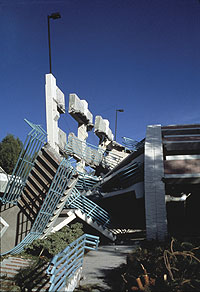
After the Disaster Despite the devastation, some members of the university community had a job to do. "The first thing we did was establish a command center in the middle of a soccer field," Erickson said. "Later, we had tents as our operations center and we had to deal with different groups: volunteers, engineers and the press from around the world."
Aftershocks continued to shake the campus. And although the tents offered some protection, it was still windy and cold. "I can remember holding staff meetings where everybody was sitting on army cots," Erickson said. "Communication was a huge problem because phone and computer lines were all down. Cell phones weren't as common then, and there was no such thing as a BlackBerry. My primary means of communication were several rolls of quarters and a payphone." Many departments didn't have telephone trees and it was difficult to get in touch with each other. "Telephone trees are very important because they're a way to keep in touch with your colleagues and each other," Erickson said. "We also used local talk radio stations and newspapers to transmit information to the greater community." Local newspapers ran ads and stories, helping CSU Northridge reach out to students and the surrounding community. Erickson's staff contended with constant rumors, including a local broadcast that claimed the science building fires were burning radioactive materials. "It is critical to get information out to the media as soon as you can," Erickson said. "In the absence of information, people will start speculating ... and that can quickly lead to rumors. When you have a story to tell, the news media can be your best friends." Assessing the damage ASAP also was a priority. "We videotaped every room, every building," he said. "Forms needed to be developed; monies that were spent needed to be audited. Everything had to be documented." Activities that used to be routine, were suddenly not so, Erickson noted. "How are we going to pay people? How are we going to keep track of hours? What happens to employees who are told not to come to work? What if the job they used to do is no longer needed in the coming months? Can you have them do something else instead?" |


 Produced by the Office of Public Affairs at California State University, Fullerton.
Contact the
Produced by the Office of Public Affairs at California State University, Fullerton.
Contact the